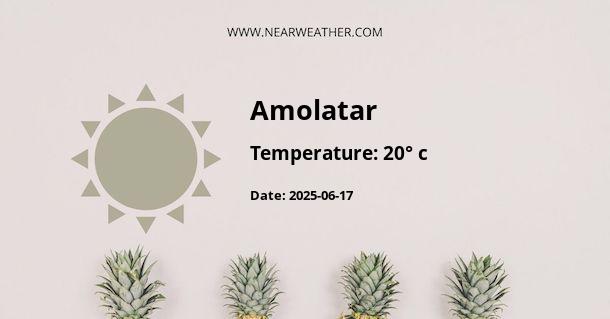A Comprehensive Guide to the Climate and Weather of Amolatar, Uganda
Geographical Overview
Amolatar District is bordered by the districts of Dokolo to the northeast, Alebtong to the east, and Lira and Apac to the south. To the west, it is bordered by Nakasongola district. It is nestled between Lake Kwania and Lake Kyoga, two significant bodies of water that substantially impact the area's weather conditions.Climate Classification
According to the Köppen-Geiger climate classification, Amolatar District falls under the category of 'Af' or Tropical Rainforest Climate. This classification implies that the district experiences high temperatures year-round and significant rainfall throughout the year.Temperature overview
As is typical of a tropical rainforest climate, Amolatar experiences uniformly high temperatures throughout the year. The average annual temperature is around 23.4°C (74.1°F). The warmest month is February, with an average temperature of 25.0°C (77°F), and the coolest month is July, with an average temperature of 22.3°C (72.1°F).
This high-temperature trend, typical of the tropical rainforest climate, means that Amolatar does not experience the traditional four-season cycle seen in temperate regions. Instead, the district's annual climate can be divided into wet and dry seasons.
Precipitation Overview
Amolatar receives significant rainfall throughout the year. The annual rainfall averages about 1,274 mm. The district experiences the most rainfall in August with an average of 200 mm, and the least rainfall in January with an average of 17 mm.
Seasonal Variations
Though Amolatar does not experience the traditional four-season cycle, it does have distinct wet and dry periods throughout the year.The Wet Seasons
Amolatar typically experiences two significant wet seasons each year. The first occurs from April to June, with the highest rainfall in May. The second, more intense, wet season happens from August to November, with peak rainfall in August and September.
The Dry Seasons
Conversely, the district also experiences two primary dry seasons. The first, and less severe, dry period occurs in January and February. The second, longer and more intense dry season, happens from June to July.
Impact of Climate on Lifestyle and Economy
The climate and weather patterns in Amolatar significantly impact the lifestyle and economy of the district. The majority of the population is engaged in agriculture, primarily subsistence farming. The timing of the planting and harvest seasons is closely tied to the district's rainfall patterns. Farmers typically plant their crops at the beginning of the wet seasons to ensure that the plants receive adequate water for growth.Conclusion
Amolatar, with its tropical rainforest climate, is a region of significant rainfall and consistently high temperatures. Despite the absence of the usual four seasons, its distinct wet and dry periods shape the lifestyle and economy of its residents. Understanding these climate patterns is not only crucial for those living in Amolatar but also for tourists planning to visit the district.A - Amolatar's Latitude is 1.615560 & Longitude is 32.839722.
A - Weather in Amolatar is 24° today.
A - Climate Conditions in Amolatar shows overcast clouds today.
A - Humidity in Amolatar is 57% today.
A - Wind speed in Amolatar is 9.36 km/h, flowing at 83° wind direction. today.
